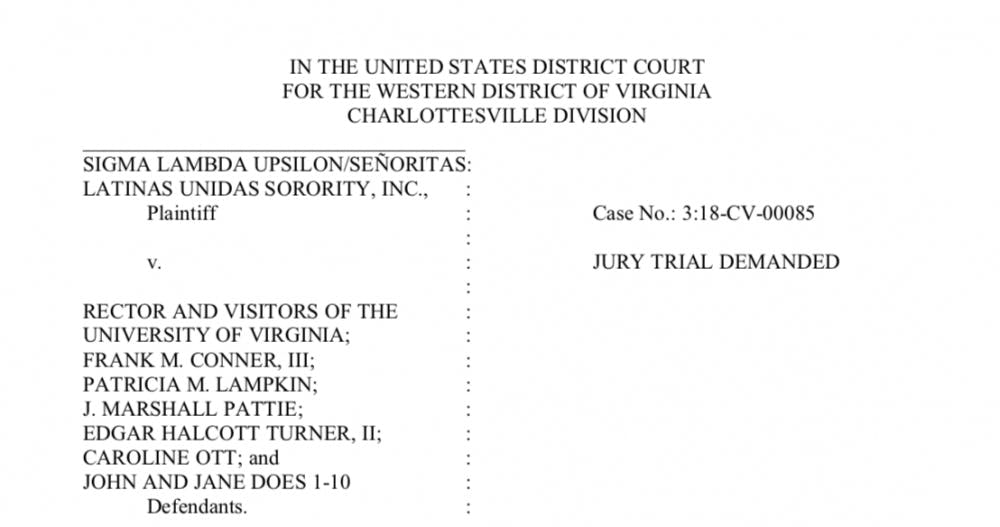The Latinx sorority Sigma Lambda Upsilon has filed a federal lawsuit against U.Va. alleging the University violated its constitutional rights by suspending the Greek chapter over hazing violations in March 2018.
Sigma Lambda Upsilon filed the lawsuit Sept. 17 in the U.S. District Court for the Western District of Virginia, which claims the University violated “SLU’s freedom to associate on campus” by suspending the sorority for violating U.Va. hazing policy by requiring rushing members to study for 25 hours every week.
An amended complaint filed by SLU Jan. 2 also names the entire Board of Visitors, Vice President and Chief Student Affairs Officer Pat Lampkin, Associate Dean of Students J. Marshall Pattie, Asst. Dean and Director of Fraternity and Sorority Life Hal Turner, FSL Program Coordinator Caroline Ott and 10 unnamed defendants.
The lawsuit said the University violated SLU’s First Amendment rights by denying the group the right to free speech and association on U.Va. property. The lawsuit also contends the University violated SLU’s Fourteenth Amendment equal protection rights by suspending SLU and not other similarly situated cultural-fraternal organizations.
The amended complaint also alleges the individual defendants engaged in a conspiracy to deprive SLU of its civil rights.
According to the complaint filed by SLU, the University “does not impose a less-than-25-study-hour rule on any other ethnic group” but holds student-athletes to a similar study policy.
The lawsuit claims the University “made its hazing finding despite never providing SLU or any other fraternal organization notice of a general prohibition against studying 25 hours per week.” Angie Aramayo, a fourth-year College student and president of SLU, did not respond to a request for comment.
Under University policy, hazing is defined as an action taken or situation created by a student organization or athletic team toward members or prospective members occuring on University-owned or leased property or at University-sponsored functions that “is designed to produce or does produce mental or physical harassment, humiliation, fatigue, degradation, ridicule, shock, or injury.” Hazing is a Class 1 misdemeanor in Virginia.
“The University does not condone hazing in any form,” University spokesperson Anthony de Bruyn said in an email statement to The Cavalier Daily. “Hazing is prohibited under the State statute on hazing ... as well as by University policy and the University’s Standards of Conduct.”
The University began investigating SLU for hazing violations around Feb. 14 after a member allegedly complained to a professor about the burden of being a first-year student and pledging for a sorority, according to the complaint. The member did not tell the professor she was being hazed, abused, assaulted or otherwise mistreated by the sorority — characteristics of hazing as defined by the University
The lawsuit also claims the University’s decision to suspend SLU was “racially discriminatory” since non-Latinx fraternal organizations have been allowed to continue operating in instances where “more serious” hazing incidents occurred.
Several other fraternal organizations were fined or sanctioned by the University in the past year for failing to comply with recruitment standards, including the Sigma Phi Society — which was briefly suspended in Spring 2017 for failing to comply with alcohol and new member education standards.
SLU seeks monetary damages against the University, including attorney fees and costs, and a ruling from the court indicating U.Va.’s practices violated the First and Fourteenth Amendments and Title IX rules.
The University declined to comment on pending legal proceedings as a matter of policy, but court documents indicate U.Va. has requested the case be dismissed on grounds of sovereign immunity — a legal doctrine that shields the government or government entities from legal action.







